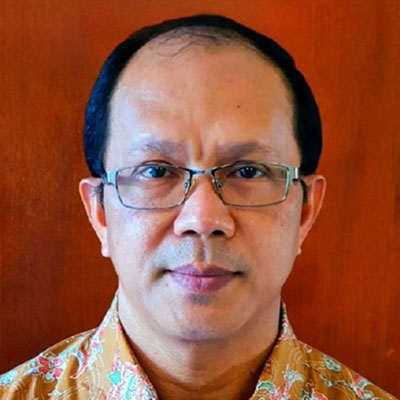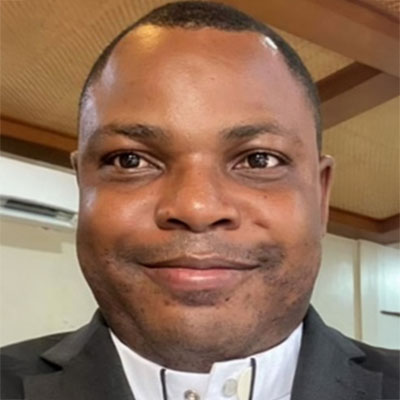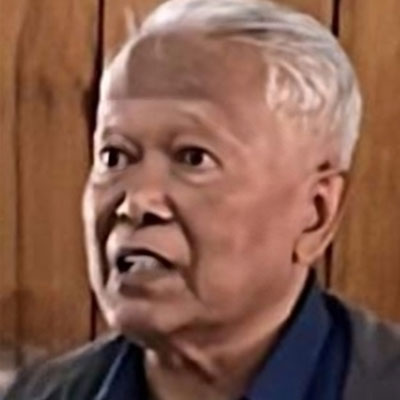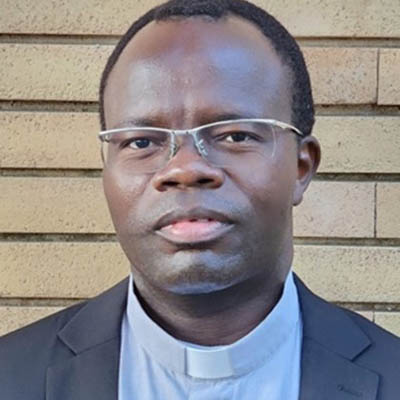 Roger Nshono Mbanji, cicm
Roger Nshono Mbanji, cicm
General Councilor
Meditation on the influences and sources of inspiration for understanding the spirituality of our Founder, Théophile Verbist
The family influence: an experience of fraternity and a school of inventiveness
The Founder, Théophile Verbist, was one of seven children in a family. He had a twin brother, Edmond, who became a lawyer. Their father, Guillaume, had worked as a businessman, clerk and sales representative. In 1830, he went into business for himself and became a banker. Unfortunately, his business collapsed a few years later, a humiliating experience for him.
The influence of his family environment is evident in broadening his horizons for new ventures. He was brilliant in his efforts to find material resources for the mission and in his ability to build relationships with people. His friendship with Aloïs Van Segvelt, his contacts with his bishop, the apostolic nuncio, and the other Belgian bishops, his openness to the spiritual advice of Benjamin Bossu, and his relations with benefactors were decisive for the future enterprise.
The Christian family is an intimate community, a school of virtues, a sanctuary of life, a domestic church, and a breeding ground for religious vocations. A positive experience of family life fosters community life and a sense of inventiveness and imagination. Our Founder saw his father working hard in the business, which fed his desire to invent, imagine, and create.
Marian devotion to Our Lady of Grace
In the articles by J. Calbrecht, we read that since 1445, a statue attached to a lime tree and dedicated to Our Lady of Grace was venerated in Scheut. Pilgrims went to this shrine where miracles were recorded. The chapel was destroyed, left in ruins, and abandoned until 1885. A man from Brussels, J.C. Brabandt, bought the land and restored the former chapel of the Carthusian monks of Scheut, which he then entrusted to the nascent Congregation. J. Rutten tells us that Théophile Verbist had a great devotion to the Virgin Mary.
This devotion to the Lady of Scheut encouraged the Founder to consecrate the new Congregation to the patronage of the Immaculate Heart of Mary, whose intercession he asked for to obtain graces: "This is the grace that I do not cease to ask for you and through the intercession of the Immaculate Heart of the Virgin Mary, our Mother and Patroness, until she leads you to the land destined for your apostolic work" (T.IIB/ L. 552/October 20 1867).
Ignatian spirituality
From age 7, our Founder attended the Jesuit school in Antwerp. When the Congregation was founded, he was accompanied spiritually by Benjamin BOSSUE, a Jesuit priest (1804-1882). At the solemn blessing of the Notre-Dame de Grâce chapel on April 27, 1863, during a Eucharistic celebration presided over by Father Théophile Verbist, Father Joachim DELCOURT, SJ, delivered the sermon. As part of the preparation for the first vows, the retreat opened on October 19, 1864, and was preached by Father Benjamin Bossue, SJ.
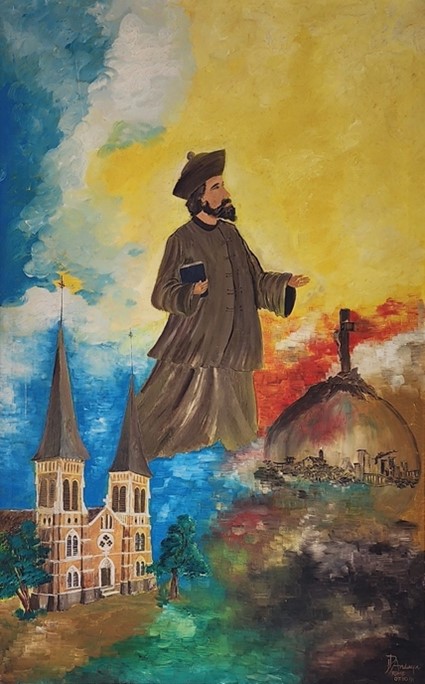
«Théophile Verbist»
An oil painting by Prudencio Andaya, Jr, cicm
Collegio Missionario CICM - Rome
Our Founder was well influenced by the Society of Jesus. Ignatian spirituality understandably influenced his language. On March 26, 1861, he wrote to Canon Éleuthère De Girardin, vice-president and director of the Œuvre de la Sainte-Enfance in Paris: "The project is bold, perhaps foolhardy, but we have thought it all through, and we do not despair, with God's help, of bringing to a successful conclusion an undertaking which has no other motive than the salvation of souls."
The Ignatian tradition helped the thinking of our Founder without making him an "Ignatian." The grace of Ignatius is that he was able to help many men and women, lay people, and priests, such as the Carthusians, Franciscans, and Dominicans, along spiritual paths that had already been mapped out for them. It is the opinion of Cardinal Martini, who believes that "Ignatius of Loyola created a method based on the spiritual exercises that he wrote and that he left us as a legacy, not only for his order but for everyone, so that they might practice familiarity with God and with Jesus Christ and learn to discern minds and reach decisions of conscience."
During my training as a formator with the Jesuits in France, I saw the influence of the Ignatian method on our religious family. I encourage confreres who can make an Ignatian retreat not to hesitate to draw on this source.
Student then formator at the minor seminary: prudence in recruitment and discipline in accompaniment
After training with the Jesuits, he entered the minor and then the major seminary in Malines. After being a student at the minor seminary, he returned there as a formator (supervisor). It would be best if you had the necessary personal discipline to be a supervisor in such an institution. In his introduction, Daniël Verhelest describes him as follows: "Without being gifted with a superior intelligence, he studied well at the minor seminary and the major seminary of Malines, working with ardor and perseverance." As a former teacher, his letters bear witness to a good knowledge of initial training.
It was an act of Providence. A friend of Théophile Verbist, Aloïs Van Segvelt, was appointed sub-regent at the same minor seminary. It may be that their desire to go on a mission united them. But when two great friends meet, there is a great openness of heart and exchange of spirit. Informal sharing is sometimes, even often, a source of great inspiration. Théophile Verbist's experience in the seminary and the pastoral field would help him to organize initial training in the Institute he was to found. In his letter 222, already quoted, he wrote: "I think it prudent, however, to advise you not to rush your admissions, my dear friends. (...) Believe me, older people are easily discouraged when they arrive here because the language is atrocious for them unless they have a solid and enduring vocation. Please, don't accept adventurers either, or those who, to get out of a situation where they can't stand it anymore, would like to come on a mission."
Military school chaplaincy: a school of endurance and determination
I've met a few military chaplains who are robust, courageous, and determined men who don't back down in the face of obstacles. The magazine, THÉOPHILE VERBIST, C.I.C.M. ONE HEART, ONE SOUL, shows young men watching him play football in his cassock. One of them asked the other two: "DID YOU SEE THAT KICK?" Another replied: "SO WHAT! HE IS SIX FEET TWO; THAT’S NOTHING EXCEPTIONAL!" A third said: "NEVERTHELESS, FATHER VERBIST IS A GREAT GUY!"
Our Founder was a man of firmness and tenacity. Endurance is the ability to resist physical fatigue or moral trials. Théophile Verbist never wavered in the face of obstacles. When he set out to found a religious institute, he knew what was at stake: rejection, pressure from benefactors to carry out his project, the missionaries' long journey to China, humiliations, misunderstandings, bad weather, epidemics, etc. When he set off for China, he knew he might never see his native Belgium again. But nothing could dissuade him from his commitment.
Chaplain to the sisters of Notre Dame de Namur in Brussels: the birth of a project
The chaplain of a religious family needs to have a good knowledge of its spirituality. Some of us who exercise a ministry of spiritual accompaniment know that after accompanying someone, something is triggered within us that either helps or disturbs us. Several Notre Dame de Namur sisters had already been in mission country since 1840. Regularly listening to the sisters' confessions and spiritual accompaniment may have been the origin of the desire to found a religious institute. It is said that it was while praying in the sisters' chapel that Théophile Verbist had the idea of becoming a missionary and, later, of founding a missionary institute.
A project comprises tasks to achieve a specific result or a set of resources and results needed to achieve a particular objective. I believe that our Founder's project was born of prayer, which indicates that the work is God-given, just like the various apostolates we undertake. His work to promote Holy Childhood inspired his missionary vocation.
Director of Holy Childhood: towards the realization of the project
While chaplain at the military academy, he learned of the illness of cadet De Mortier. During a visit to the patient, they had a conversation. During this conversation, he discovered that De Mortier's sisters were busy with their work at Holy Childhood and were unable to visit him. This simple bedside conversation led to the chaplain's lifelong dream of going to China.
De Mortier was perhaps unaware of his comment's impact on Verbist's heart. In his book "Missionnaires CICM 1966-2016, 50 ans au service de l'Église qui est au Cameroun", on page 38, Father Sinclair Boko talks about the invisible efforts of the confreres in the service of the mission: "Through the use of words, the confreres have been able to breathe life into many people and have undoubtedly helped them to change their lives, both in their encounter with God and in their search for their vocation." These invisible efforts profoundly impact us, often without our realizing it.
We remember the Virgin Mary's simple observation at the wedding feast in Cana: "They have no more wine," which led to a significant miracle and a series of subsequent miracles. We also remember the song repeated by a child as Saint Augustine grappled with his inner struggle: "Take and read!" With the support of Alypius, he was guided in his discernment. September 10, 1946, marked a turning point in Mother Teresa's life. On her way to her annual retreat in Darjeeling, she felt "the call within the call" - a vocation to care for the poorest of the poor. That inspiring day awakened a deep thirst to love and be loved by the poorest of the poor. This desire, sparked by meeting a dying man in need of water, became the driving force behind her life's work.
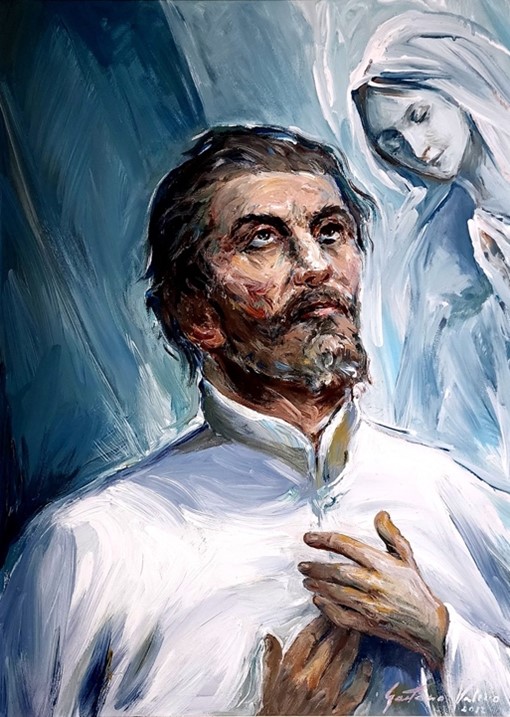
«Théophile Verbist»
An oil painting by G. Valerio,
Collegio Missionero CICM – Roma
Théophile Verbist's visit to the bedside of a sick man changed his life, leading him to become the National Director of Holy Childhood and to devote himself selflessly. This visit awakened a call that shaped his vocation as a Founder. He put this into practice by seizing the opportunities presented to him.
The ratification of the Treaty of Tianjin and the departure of the Lazarists: A sign of Divine Providence
On October 25, 1860, the Treaty of Tianjin was ratified between the Emperors of China and France, marking the gates opening to China. This landmark event inspired Father Théophile Verbist to take up a missionary vocation. He shared this desire with his spiritual director, Father Benjamin Bossue, SJ, his childhood friend Father Aloïs Van Segvelt, and Cardinal Sterckx, Archbishop of Malines.
In 1864, the Superior General of the Lazarists, Jean-Baptiste Etienne, wrote to the Cardinal-Prefect of the Congregation for the Propagation of the Faith, expressing the withdrawal of the missionaries from Mongolia and Honan due to a lack of personnel. This was an opportunity for Théophile Verbist and his companions to be entrusted with the territory (Cf. Scheut hier et aujourd'hui, 1862-1987, p. 34).
The events of our lives are privileged places for discerning God's will and helping us to understand the spirituality of Divine Providence, in which our Founder firmly believed. We need to discern God's will. Discernment is a gift from God. We can find meaning in each moment by considering the situation and meditating on the Scriptures, in which the Holy Spirit has revealed how God's plan unfolds. Listening to God is crucial for discernment, especially when caring for the least and the abandoned. (Cf. Mt 11:25). For the Founder, it was in the sequence of events that he discovered God's will. The ratification of this treaty and the departure of the Lazarists were a sign from heaven that opened the doors of China to him. However, he would have to face many trials and constraints.
In reflecting on the life of the Founder, I have identified several influences and sources of inspiration, to which I add the impact of the Spiritan rule in drafting the first statutes. The influences I have identified stem from my sensitivity. On rereading, I realized that the founding of the CICM by Théophile Verbist remains relevant despite the time gap. He lived in his time, but his ideas continue to be a source of inspiration for our daily lives and our work. The life of Théophile Verbist has taught me never to lose heart and to remember that God's works never take root without encountering extraordinary difficulties. Like him, I believe that "Amanti nihil difficile". The Lord of the Mission transforms sorrows into joys and thorns into consolations (T.IIB/ L. 419/March 16, 1867).
Like him, I believe that we have sufficient proof of God's will for the work; it is part of his plans; the present difficulties are trials, and with God's grace, we shall overcome them. (T.IIA/ L.167/May 23, 1866). Like him, "My opinion is always that we have a good and beautiful mission, but that we need a good vocation to work at it, without which we are miserable." (T.IIB/ L. 501/mid-July 1867).
Like Théophile Verbist, I believe that human qualities are insufficient to accomplish God's work. In his letter 549 of October 20, 1867, Théophile Verbist addressed these strong words to the novitiate: "Humanly speaking, the terrain is ungrateful, and the spiritual forces acquired must far surpass the bodily forces." We pray "that the good God will give us the necessary enlightenment and prudence..." (cf. T.IIA/L. 56/27 November 1865).




